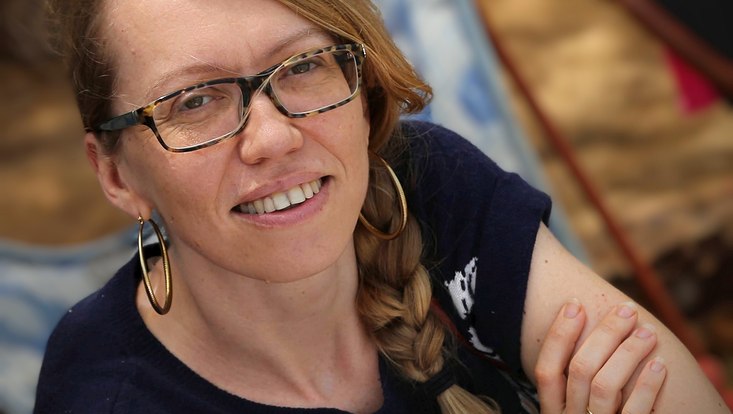Dr. Monika Brodnicka

Curriculum
Monika Brodnicka is currently a Visiting Assistant Professor at Amherst College in the Religion and French Departments. She previously taught in the African American and African Studies Department at The Ohio State University and in the Philosophy Department at Regis University and served as the Academic Director at the School for International Training (SIT Study Abroad) in Dakar, Senegal. Her research and publications focus on African spirituality and Sufi thought and practice in Francophone West Africa. She has recently published The Ambiguous Path to Sacred Personhood: Revisiting Samba Diallo’s Initiatic Journey in Cheikh Hamidou Kane’s Ambiguous Adventure and Speech that Takes on Body and Shape: The World as Manifestation of Spirit in West African Religions. Her current book project, entitled Amadou Hampâté Bâ and the Living Tradition: Mystical Perception as Methodology in West African Religions, addresses the role of the metaphysical dimension in the Fulani and Bamana as developed by Bâ. Brodnicka has studied and researched in several West African countries.
Publications (selection)
- Creolizing the Creolized through Amadou Hampaté Bâ’s Living Tradition, Philosophy and Global Affairs, 1:2 (2021): pp. 361-369 DOI: 10.5840/pga202192822.
- The Ambiguous Path to Sacred Personhood: revisiting Ambiguous Adventure from the perspective of living tradition, Journal of World Philosophies, 5 (Winter 2020): pp. 13-27.
- Speech that Takes on Body and Shape: The World as Manifestation of Spirit in West African Religions, Journal of Religion in Africa, 47:3 (2017): pp. 311-345.
- Iterations of the Divine: The Pursuit of Sacred Personhood in West African Spirituality, Journal of Academic Perspectives, 2016, no. 4 (2016): pp. 1-20.
- Motherhood and the Meaning of Sacrifice: Living in Defeat and Dying in Triumph JENdA, A Journal of Culture and African Women Studies: Motherhood Studies in Africana Studies, 23 (2013): pp. 76-89.
Research project: Force as Living Tradition in West African Metaphysics
This project addresses the notion of force, as it pertains to metaphysics examined by three important Negritude scholars, namely Léopold Sedar Senghor, Boubou Hama, and Amadou Hampâté Bâ. It will engage the similarities and variances of the idea of force, particularly as a representation of an underlying reality in the world, which is informed by the respective local religious traditions of the three scholars. My point of entry to the reflection on force in the works of Senghor, Hama, and Bâ is through Bâ’s concept of the living tradition. I explore how the three scholars engage with the living tradition through the archetypes of the Word, the World, and the Person. This process is encapsulated by the presence of the sacred force, conceived as the foundation of all existence, and its manifestations, understood as expressions of the sacred force through different forms. Further, I examine how this dynamic is expressed through the dual format of sound and silence associated with sacred speech. In this scenario, communication expresses itself through the surrounding environment, as well as through human-initiated forms of creation, such as divination, ritual, and art. As such, force becomes the essence of reality as well as its rich and varied expressions.
Research results: Force as Living Tradition in West African Metaphysics
The Centre of Advanced Studies has played a crucial role in developing my manuscript, which has transformed from a vague idea to a more concrete and measurable project that has a clear path toward its completion. My fellowship focused on three main tasks: the preparation of my presentation entitled “Force as Living Tradition in West African Metaphysics,” the completion of my chapter on Amadou Hampâté Bâ’s concept of personhood, and a reformulation of the main idea of another chapter on Bâ’s notion on language. Each of these scholarly engagements benefitted from a more nuanced understanding and discussion of forces thanks to the workshops, presentations, and discussions with my colleagues, as well as my own research and writing.
Preparation for my talk inspired me to revisit Bâ’s development of the Fulani and Bamana concept of the world, which illustrates metaphysics through an organized conception of force, on both the spiritual and the material dimensions. Work on my subsequent chapter, on the other hand, resulted in a better understanding of the evolution of personhood in African philosophy. It equally identified Bâ’s important place within the discourse, which stands as an alternative to binary elaborations of the concept. Research, writing, and receiving feedback on these two chapters also helped me recognize the need to establish a connection between orality and epistemology in Bâ’s discussion of language.
My research and writing during the fellowship, founded on the discussions of force, also helped to inform my professional presence outside of CAS. During this time, I presented at two international conferences and submitted an article connected to my project for publication. I am truly grateful to the organizers as well as all of my colleagues for providing such an inspiring space to grow intellectually and personally. I am equally thankful to the leadership for offering the opportunity develop our ideas in such a convivial atmosphere.
